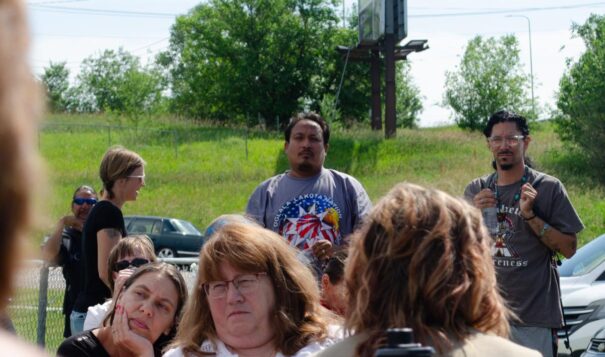News Based on facts, either observed and verified directly by the reporter, or reported and verified from knowledgeable sources.
Community left with more questions, fewer answers
 Lloyd Big Crow (middle), Lakota and the founder of Oyáte kiŋ čhaŋtéwaštepi watches on as the community meets for a discussion regarding the weekly meals provided to the homeless community. Big Crow has organized the Friday meals since 2018. Photo by Amelia Schafer
Lloyd Big Crow (middle), Lakota and the founder of Oyáte kiŋ čhaŋtéwaštepi watches on as the community meets for a discussion regarding the weekly meals provided to the homeless community. Big Crow has organized the Friday meals since 2018. Photo by Amelia Schafer
A new location for the weekly community meals in Rapid City is still undetermined
Emotions ran high on Wednesday as community members met to discuss the recent displacement of the weekly meals provided to the primarily Indigenous homeless community in Rapid City.
Indigenous leaders discussed frustrations with a lack of a current plan to help provide weekly meals to the area’s homeless while the Rapid City Police Department’s Community Outreach Division discussed the potential for a more permanent solution down the line.
“While this new facility is being built, I don’t see why we can’t allow everyone to continue to use the bandshell,” Brandon Ferguson, Lakota, of Ending the Silence, said. “We all know the reality that this is probably not going to happen any time soon and there’s already a structure that’s already built and it’s in an area that’s very sacred for our people traditionally.”
Seventy-six percent of those experiencing homelessness in Rapid City are Native American, according to the US census.
Several organizations host meals throughout the week to provide relatives with a home-cooked meal and a chance to gather as a community, most times these occur at the Memorial Park bandshell, which is near Rapid Creek. Rapid Creek has been used as a site for gathering for the Lakota people for generations.
Earlier this month, the city began to enforce the $100 per day fee to reserve the bandshell for events, which must be paid 90 days in advance. Due to this, the weekly meals have been displaced and disrupted for the past few weeks.
Lila Mehlhaff, Hunkpapa Lakota of the Standing Rock Nation, and Jaime Kekscht of the Rapid City Police Department’s Community Outreach Division proposed that a new structure would be erected potentially at the Denver Street Soccer Fields.
“We are hoping to provide a centralized location for all of our community resource partners who do feedings for our community,” Mehlaff said. “We would like to provide services to our houseless community or people on the verge of homelessness.”
The proposed facility would include an enclosed space for meals during bad weather, restrooms and a gathering place and may function similarly to the courtyard in San Antonio, Texas which services its homeless population.
No one opposed the proposed idea, but community members were concerned about the lack of temporary solutions for providing meals in the time it would take to build a new permanent facility.
Several community members voiced frustrations about the current lack of a plan for where they should feed homeless relatives who are currently still living on the streets without food while the city comes up with a new location. Additionally, others felt that the larger scope of systemic issues facing the Indigenous population was not being paid enough attention.
“(In Rapid City) White people have an 8 percent poverty rate, Natives, we have a 49 percent poverty rate, half of us are living below the poverty line,” Natalie Stites Means, a Lakota/Dakota community activist, said. “This isn’t just about homelessness, it’s not just about addiction, we see families come out to those meals.”
Throughout COVID-19, Stites Means and her group Wotakuye Justice Coalition provided over 7,000 people with meals. Stites Means said this was possible through strategic planning and community participation.
“This meeting here is very good, but it’s not a strategic focus group. It’s not about a strategic plan,” Stites Means said. “We are related to everybody on the streets through our people.”
Other weekly meal participants voiced frustration with the city’s treatment of the situation.
“We are there every Saturday, we have people standing here who are putting on a face today, but behind the scenes are trying to get us to quit,” Bobbi Jean Jarvien of Jesus’ Hands said.
Lloyd Big Crow, Oglala Lakota and the founder of Oyáte kiŋ čhaŋtéwaštepi, organizes the weekly Friday meals and doesn’t plan on stopping.
“I just want you guys to know that we will still be at the bandshell exercising our treaty rights,” Big Crow said. “Not only do we serve a meal, we also encourage them to go to treatment. We’re doing a lot on our part to help the community, but it seems like the non-Natives are giving us the most pushback.”
Last week’s meal was held at the skatepark off New York Street, as there was a musical event happening at the Memorial Park Bandshell. According to Mary Haan, a weekly volunteer at the meals, guests at the musical event were seen drinking alcohol and putting up tents, both of which the Indigenous community has been previously arrested for.
“Unsheltered folks can see that double standard,” Haan said.
The meeting concluded after an hour with no solid plan in place for meals until the proposed structure would be built.
This story is co-published by the Rapid City Journal and ICT, a news partnership that covers Indigenous communities in the South Dakota area.
Dateline:
RAPID CITY, SD
